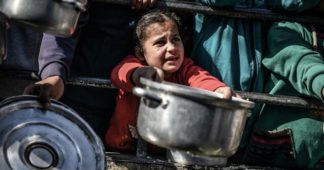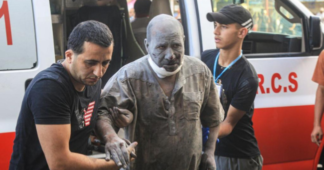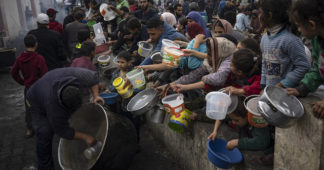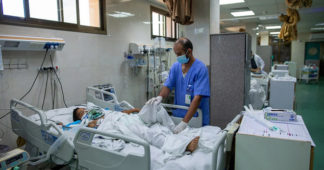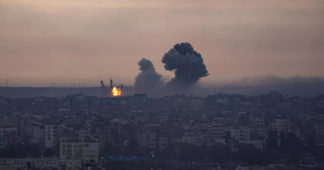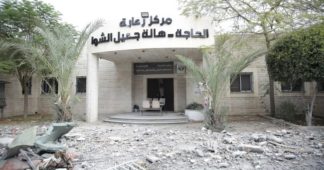Mar 18, 2024
The latest analysis from the Integrated Food Security Phase Classification (IPC) partnership released today warns that the situation in Gaza is catastrophic, with northern Gaza facing imminent famine and the rest of the Strip at risk as well.
“The IPC announcement reflects the dire situation that the people of Gaza are facing,” said WHO Director-General Dr Tedros Adhanom Ghebreyesus. “Before this crisis, there was enough food in Gaza to feed the population. Malnutrition was a rare occurrence. Now, people are dying, and many more are sick. Over a million people are expected to face catastrophic hunger unless significantly more food is allowed to enter Gaza.”
Before the recent months’ hostilities, 0.8% of children under 5 years of age were acutely malnourished. Today’s report shows that as of February in the northern governorates, that figure is between 12.4 and 16.5%.
Without a significant and immediate increase in deliveries of food, water and other essential supplies, conditions will continue deteriorating. Virtually all households are already skipping meals every day and adults are reducing their meals so that children can eat.
The current situation will have long-term effects on the lives and health of thousands. Right now, children are dying from the combined effects of malnutrition and disease. Malnutrition makes people more vulnerable to getting severely ill, experiencing slow recovery, or dying when they are infected with a disease. The long-term effects of malnutrition, low consumption of nutrient-rich foods, repeated infections, and lack of hygiene and sanitation services slow children’s overall growth. This compromises the health and well-being of an entire future generation.
WHO and partners have been carrying out high-risk missions to deliver medicines, fuel and food for health workers and their patients, but our requests to deliver supplies are often blocked or refused. Damaged roads and continuous fighting, including in and close to hospitals, mean deliveries are few and slow.
The IPC report confirms what we, our UN partners and nongovernmental organizations (NGOs) have been witnessing and reporting for months. When our missions reach hospitals, we meet exhausted and hungry health workers who ask us for food and water. We see patients trying to recover from life-saving surgeries and losses of limbs, or sick with cancer or diabetes, mothers who have just given birth, or newborn babies, all suffering from hunger and the diseases that stalk it.
WHO, as a partner of the Nutrition Cluster, is currently supporting a nutrition stabilization center in Rafah to treat children with severe acute malnutrition with medical complications, who are at the highest risk of imminent death if not urgently treated. We are supporting the establishment of two additional centres: one in the north of Gaza at Kamal Adwan hospital and one at the International Medical Corps field hospital in Rafah. WHO is supporting the pediatric wards of Al-Aqsa and Al-Najjar hospitals through the provision of nutrition supplies and medicines as well as training of medical personnel, and the promotion of appropriate infant and young child feeding practices, including breastfeeding.
WHO has trained health workers on how to recognize and treat malnutrition with complications. WHO is supporting hospitals and the centers with medical supplies for the children being treated.
Further nutrition and stabilization centres need to be added in all key hospitals in Gaza. Communities themselves will need the support to scale up the management of malnutrition locally.
WHO and other UN partners again ask Israel to open more crossings and accelerate the entry and delivery of water, food, medical supplies and other humanitarian aid into and within Gaza. As the occupying force, it is their responsibility under international law to allow for the passage of supplies including food. Recent efforts to deliver by air and sea are welcome, but only the expansion of land-crossings will enable large-scale deliveries to prevent famine. The time to act is now.
###
Note to editors
The Integrated Food Security Phase Classification (IPC) is a multi-partner initiative for improving food security and nutrition analysis and decision-making. By using the IPC classification and analytical approach, governments, UN Agencies, NGOs, civil society and other relevant actors, work together to determine the severity and magnitude of acute and chronic food insecurity, and acute malnutrition situations in a country, according to internationally recognized standards.
As a member of the IPC partnership, WHO provided technical expertise and information on the health situation for this evaluation. The conflict is posing extreme limitations to the ability to deliver life-saving health assistance to the population. In February 2024, attacks against health-care facilities, infrastructures and services continued, resulting in 58% of the hospitals not functioning in Gaza, especially in the Northern governorates (75% of the hospitals not functioning). According to the Health Cluster, as of 5 March 2024, only 2 hospitals and no Primary Health Care Centres were fully functioning. Acute respiratory infections and diarrheal diseases are rampant among children under five, exposing them to high-risk nutritional deterioration.
The full recommendations from the IPC
Famine can be halted—both in the immediate term and it requires urgent and proactive measures from parties to the conflict and the international community. They must immediately curb the rapidly escalating hunger crisis in the Gaza Strip, garner political support to put an end to the hostilities, mobilize necessary resources and ensure the safe delivery of humanitarian aid to the people of Gaza.
Overall recommendations
- Restore humanitarian access to the entire Gaza Strip.
- Stop the fast-paced deterioration of the food security, health and nutrition situation leading to excess mortality through: the restoration of health, nutrition, and WASH services and the protection of civilians; and the provision of safe, nutritious, and sufficient food to all the population in need.
- The sustained supply of sufficient aid commodities, including but not limited to food, medicines, specialist nutrition products, fuel, and other necessities should be allowed to enter and move throughout the entire Gaza Strip by road. Traffic of commercial goods should also be fully resumed to meet the volume of commodities required.
We remind our readers that publication of articles on our site does not mean that we agree with what is written. Our policy is to publish anything which we consider of interest, so as to assist our readers in forming their opinions. Sometimes we even publish articles with which we totally disagree, since we believe it is important for our readers to be informed on as wide a spectrum of views as possible.
